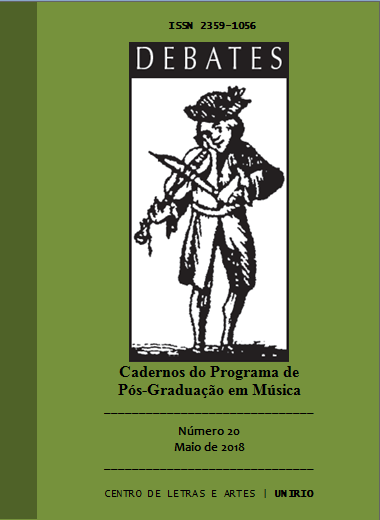Musical Performance Ethics
Keywords:
Musical Performance, Ethics, Performance Philosophy, Contemporary MusicAbstract
Is there such a thing in music as meaning? This question has been made several times in the history of western music, but, anyways, what is the consequence of its answer for musical performance? This short reflection aims to bring some references for guiding the research on ways of making music that embody values as meaning and affections. For the whole history of human thought Ethics has been the discipline where values and beliefs are put into practice. The assumption of existence or not of something in reality necessarily led to a consequent action. Thus, Ethics deals not that much with the righteousness of an action but with the responsibility of doing the action. This is how can be suggested such a thing as a musical performance Ethics; not in the sense of a right or wrong performance, but as a responsible and adequate performance in relation of a set of values (and finally to reality). This matter will be considered mostly after two branches of Aristotelian works: Rhetoric and Ethics. Finally, the reflection ends with the proposition of a musical phronesis, with special focus on the performance of the contemporary repertoire.
Downloads
References
ARISTOTLE. Complete Works. Translated by H. Rackham. Cambridge: Harvard University Press, 1934
BAILEY, Derek. Improvisation: its nature and practice in music. Cambridge: Da Capo Press, 1993.
BARTH, Karl. The Church Dogmatics. Volume II. Translated by Geoffrey Bromiley et al. Edimburgo: T&T Clark, 1957.
BEGBIE, Jeremy. Theology, Music and Time. Cambridge: Cambridge University Press, 2000.
BENSON, Bruce Ellis. The Improvisation of Musical Dialogue: a Phenomenology of Music. Cambridge: Cambridge University Press, 2003.
BERIO, Luciano. Contrechamps. Vol. 10. Paris: L’Age D’Homme, 1983.
BERLINER, Paul. Thinking in Jazz: The Infinite Art of Improvisation. Chicago: The University of Chicago Press, 1994.
BLACKING, John. How Musical is Man? Washington: Washington University Press, 1974.
BONHOEFFER, Dietrich. Ethics. Translated by Reinhard Krauss et al. Minneapolis: Fortress Press, 2008.
CAGE, John; DUFFIE, Bruce. Composer John Cage: a conversation with Bruce Duffie. Available at http://www.bruceduffie.com/cage.html. 1987.
DELEUZE, Gilles. Spinoza: Practical Philosophy. Translated by Robert Hurley. San Francisco: City Light Books, 1988
DOMENICI, Catarina. His Master’s Voice: a voz do poder e o poder da voz. Revista do Conservatório de Música da UFPel, No.5, 2012 p. 65-97.
HEIDEGGER, Martin. Plato’s Sophist. Bloomington: Indiana University Press, 2003.
KIERKEGAARD, S. A. Either/Or. Part II. Translated by Howard V. Hong e Edna H. Hong. Princeton: Princeton University Press, 1987.
________________. Stages of Life’s Way. Translated by Howard V. Hong e Edna H. Hong. Princeton: Princeton University Press, 1988.
MEYER, Michel. Principia Moralia. Paris: Fayard, 2013.
NOSKE, Fritz. Forma Formans. International Review of the Aesthetics and Sociology of Music, Vol. 7, No. 1 (Jun., 1976), pp. 43-62.
PERLMAN, Alan; GREENBLATT, Daniel. Miles Davis Meets Noam Chomsky: Some Observation and Language Structure. In: STEINER, Wendy (org,). The Sign in Music and Literature. Austin: University of Texas Press, 1994.
PETERS, Gary. The Philosophy of Improvisation. Chicago: The University of Chicago Press, 2009.
POLANYI, Michael. Personal Knowledge: Towards a Post-Critical Philosophy. London: Routledge, 1962.
RICOEUR, Paul . Arts, langage et herméneutique esthétique: Entretien avec Paul Ricœur par Jean-Marie Brohm and Magali Uhl. Available at http://www.philagora.net/philo-fac/ricoeur.php, 1996.
SPINELLI, Miguel. Sobre as diferenças entre éthos com epsílon e êthos com eta. Trans/Form/Ação, v. 32, n. 2, p. 9-44, 2009.
STRAVISNKY, Igor. Poetics of Music: in the form of six lessons. Cambridge: Harvard University Press, 1947.
TEIXEIRA, William; FERRAZ, Silvio. Música como ação. Revista Vórtex. v.5, n. 1, 2017.
VANHOOZER, Kevin. The Drama of Doctrine: A Canonical Linguistic Approach to Christian Doctrine. Louisville: Westminster John Knox Press, 2005.
__________________ . Praising in Song: Beauty and the Arts In. HAUERWAS, Stanley; WELLS, Samuel. The Blackwell Companion to Christian Ethics. Londres: Blackwell, 2004.
_________________ . Biblical Authority After Babel: Retrieving the Solas in the Spirit of Mere Protestant Christianity. Grand Rapids: Baker, 2016.
WALTKE, Bruce; FREDRICKS, Cathi. Genesis: a commentary. Grand Rapids: Zondervan, 2001.
WARREN, Jeff. Music and Ethical Responsibility. Cambridge: Cambridge University Press, 2014.
WOLTERSTORFF. Nicholas. Works and Worlds of Art. Oxford: Oxford University Press, 1980.
WU, Roberto. A ontologia da phronesis: a leitura heideggeriana da ética de Aristóteles. Veritas. Porto Alegre, v. 56, n. 1 jan./abr, 2011, p. 95-110.


